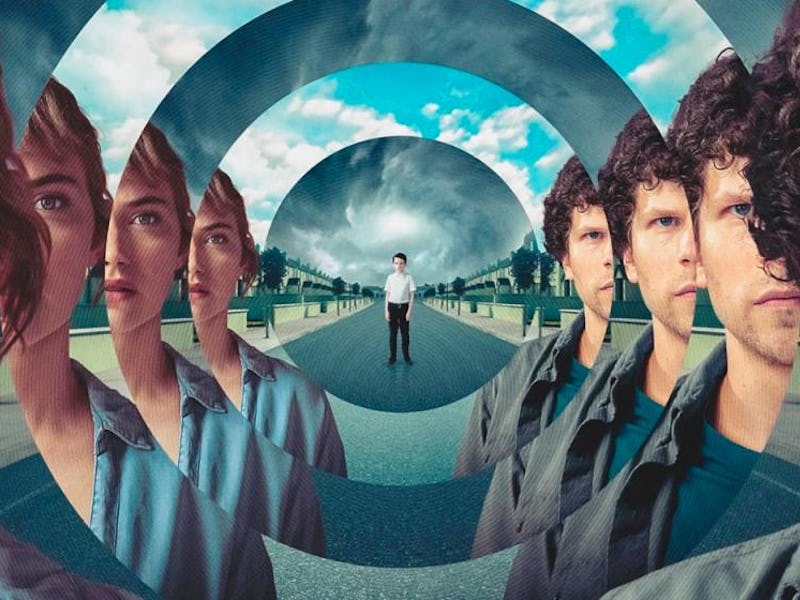
Things are bad right now. I don't need to go into why. You already know. And if you're reading this months or years in the future, just look up what was happening on Earth in March 2020 and you'll figure it out. But as bad as things get — and all signs suggest it's going to get a lot worse — at least we're not living out the isolated hellscape that Vivarium presents.
Out March 27 on digital release, Vivarium is a stark reminder that things can always get worse. It's also a trippy, sci-fi exploration of modern isolation that hits a little too close to home right now.
Directed by up-and-coming science fiction auteur Lorcan Finnegan, Vivarium stars Jesse Eisenberg and Imogen Poots as a young couple who set out to buy a home and wind up trapped in a planned suburban community that's totally empty, with one small exception.
After being led to a neighborhood called "Yonder," Poots and Eisenberg are abandoned by their awkward realtor and quickly realize they're being held in captivity by some supernatural force. Flavorless food arrives in boxes. Then a baby shows up, also in a box, along with this ominous message: Raise it and be released.
Jesse Eisenberg and Imogen Poots star in 'Vivarium'.
Of course, this is no ordinary baby. The young boy looks like a human but ages rapidly, growing from infant to young man in just a few weeks or months. (Time quickly melts away in Vivarium, but Poots and Eisenberg don't seem to age even as their physical and mental health quickly decays.) The boy also shrieks an in-human shriek whenever he's hungry and stays up late watching hypnotic patterns on the living room TV.
It's weird as hell, but also eerily familiar. Setting the most jarring sci-fi movie of the year (so far) in such a bland setting is an impressive trick, which only works thanks to some clever camera work and a lot of heavy lifting from Vivarium's two lead actors. Jesse Eisenberg puts on quite a show, literally descending into madness as he begins to dig a never-ending hole in the house's front yard.
Imogen Poots' performance is a little more subtle and complex. Unlike Eisenberg, who rejects this child completely, she attempts to mother it, hoping this will unfurl the mystery of why they're trapped in the first place. Poots shows impressive range as an actor, quickly oscillating between warmth and rage in what the actress describes as an exploration of womanhood.
"Going in, I connected with the questions of womanhood and the emotions and feelings that supposedly make you a woman," Poots tells Inverse. "Obviously, included in that is motherhood; whether it comes naturally to be able to nurture and should you feel immediate compassion for a young child when it's been placed in your care."
Parenthood, amirite?
Vivarium doesn't have an answer to that, or really any of the questions that it poses. Poots adds that for the director (who also worked on the script), the movie is a metaphor for Ireland's housing crisis, which led to hundreds of "ghost estates" across the country.
She also argues that so many of the bizarre tortures inflicted on her character in Vivarium could actually be construed as a convenience or even a luxury in another context.
"Everything is getting more diluted as we've set into this one-size-fits-all society," Poots says. "So even though it's Hell, you could argue that where they are in Vivarium is some sort of paradise. It's the paradise we all asked for, which is a nice clean house and cable TV and food delivered to you and even a baby delivered to you. The ennui of it all is a paralysis."
This all makes sense. The womanhood metaphor. The commentary on housing injustice. The satire of the Amazon-enabled lifestyles we're already racing towards. But I can't stop thinking of Vivarium in terms of our own current real-life dilemma.
Stuck at home, I may be bored and frightened, but at least I can walk in the park and see other people (from a distance). At least the food has taste and weather still exists. Those things could disappear. A mutant baby could show up at my doorstep. Life could be worse. I could be in Vivarium.